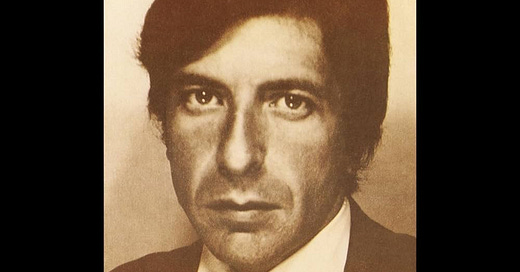Setbacks are Inevitable, Defeat is Optional: The Strength of Leonard Cohen
“You look around and you see a world that is impenetrable, that cannot be made sense of. You either raise your fist, or you say Hallelujah. I try to do both.” Leonard Cohen
Leonard Cohen didn’t record his first album until he was thirty-three. It was 1967 and by the standards of the hippie era (“Don't trust anyone over 30.”), he was late to the game. “A thirty-two-year-old poet? Are you crazy?” one record label executive said when Cohen was signed.
I just finished the Cohen biography I’m Your Man and a heartwarming documentary about the origins of Hallelujah, his best-known song (famously covered by Jeff Buckley and many others).
I was struck by a particular aspect of Cohen’s story: his resilience.
You see, by ‘67 Cohen was already an award-winning poet and novelist. The free-spirited bohemian had moved from Montreal to the Greek island of Hydra. There was only one issue: money.
Hydra was cheap, but not cheap enough. “I couldn’t pay my grocery bill,” Cohen explained, “so I would come back to Canada, get various jobs, get that money together plus the boat fare, come back to Greece, and live for as long as that money lasted.”
At a time when people were still reading, Cohen still “couldn’t make a living as an author.” How easy would it have been for him to throw up his hands in resentment and abandon his art. Wasn’t the world telling him that what he did was not valuable enough? Instead, he picked up his guitar and turned poems into songs.
Now let’s fast forward about forty years…
When Cohen’s long-time manager passed away in the 1980s, his assistant Kelley Lynch took over management of Cohen’s affairs. Cohen and Kelly had a brief “casual sexual arrangement” but remained friends and Cohen kept her as his new manager. Artists, am I right? In any event, in the 1990s Cohen spent six years at a Zen monastery. He gave Lynch broad power of attorney over his financial affairs.
In 2004, Cohen’s daughter was warned about Lynch. When Cohen reviewed his accounts, he found that Lynch had been taking money. One of the first things he noticed was a personal American Express bill of $75,000 that Lynch had paid out of Cohen’s accounts. After months of work, his lawyer estimated that “between ten and thirteen million dollars had been improperly taken.”
Cohen was 70 years old. One day, as he put it, he “walked to the ATM” and his money was gone.
It seems to me there were two ways he could have responded.




